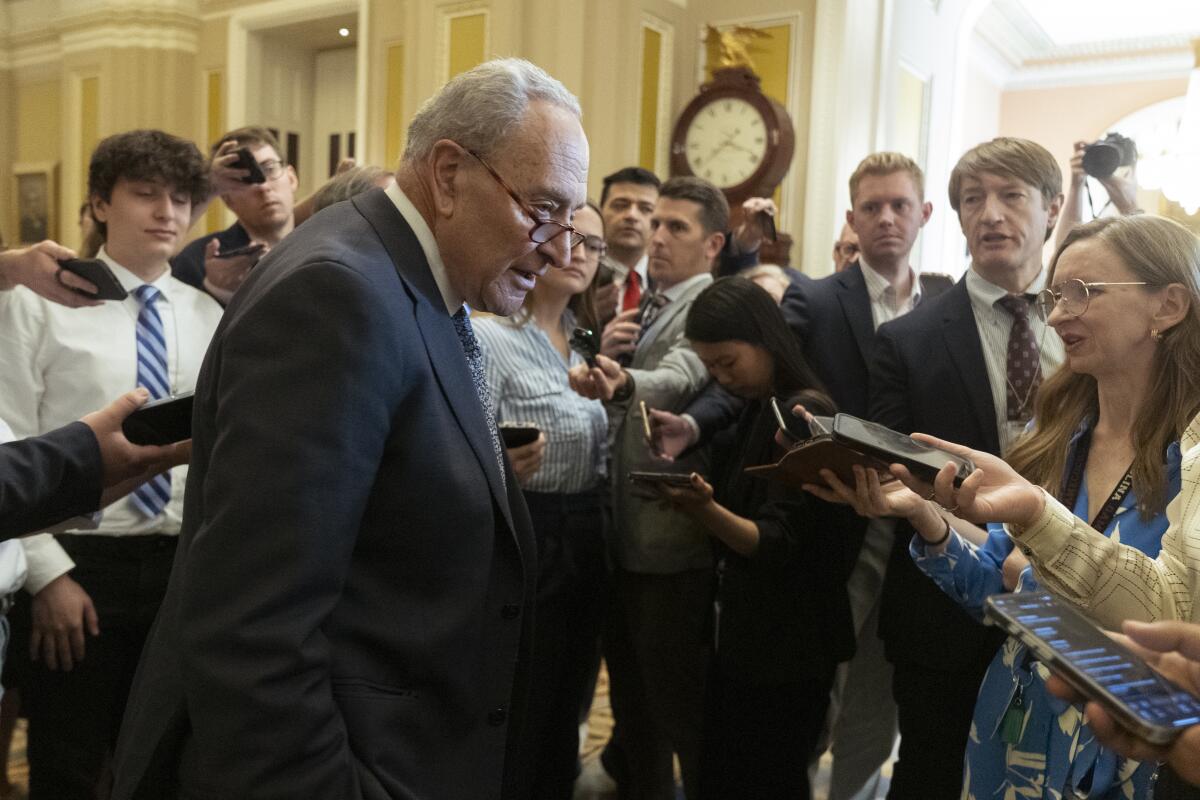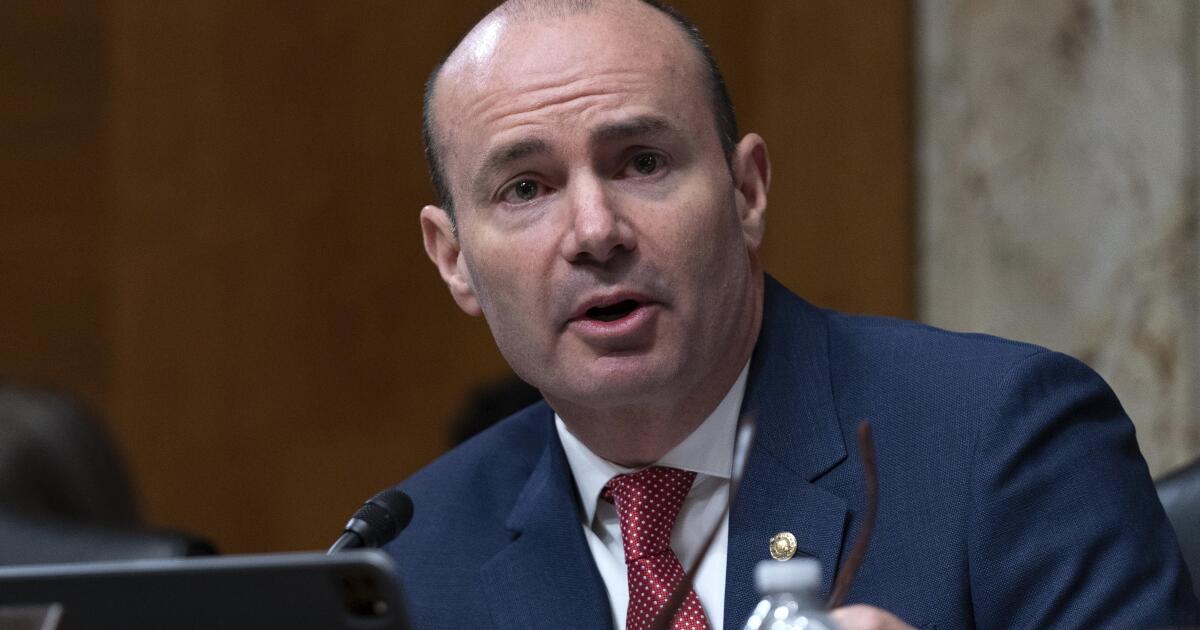Trump’s megabill inches toward Senate passage
WASHINGTON — President Trump’s megabill encompassing his domestic agenda on Monday inched closer to becoming law as Republican senators sifted through familiar procedural hurdles toward a final vote on legislation that would dramatically transform the tax code and Medicaid.
Throughout a day of marathon voting, senators offered amendments to the bill that could ultimately decide whether it secures passage through Congress. If the Senate approves the legislation — as it is expected to do by a slim, simple majority and with bipartisan opposition — then the House will have to vote for a second time on the final text before it goes to the president’s desk for his signature.
Anticipating Senate passage, the House Rules Committee has already scheduled a hearing on reconciling the two bills for Tuesday. The White House previously set July 4 as a goal to get the package, called the “One Big Beautiful Bill Act,” passed by both chambers.
But several Republicans are still criticizing the bill, including Sens. Rand Paul of Kentucky and Thom Tillis of North Carolina, who announced he will not seek reelection in 2026 over the weekend before ripping into the legislation as a “betrayal” to voters.
Although the legislation has hundreds of provisions, its most sweeping would make tax breaks passed in 2017 during Trump’s first term permanent — an expensive proposition — before they are set to expire at the end of this year, while attempting to offset some of those costs with historic cuts to Medicaid and the Supplemental Nutrition Assistance Program, social welfare programs that for decades had been seen as a political third rail.
Polling shows that Americans broadly support extending the 2017 tax cuts. Other expensive programs in the bill — including additional funding for border security and defense — also enjoy public support. But polls indicate that the public disapproves of the bill overall by a double-digit margin due to its cuts to core government programs.
“What do I tell 663,000 people in two years or three years, when President Trump breaks his promise by pushing them off of Medicaid because the funding’s not there anymore?” Tillis said in a speech from the Senate floor. “The people in the White House advising the president are not telling him that the effect of this bill is to break a promise.”
Both Paul and Tillis voted against advancing the bill to a floor vote and have indicated they will vote “no” on its final passage.
“Republicans are about to make a mistake on healthcare, and betraying a promise,” Tillis continued. “It is inescapable that this bill in its current form will betray the very promise that Donald J. Trump made in the Oval Office, or in the Cabinet room, when I was there with Finance [Committee members] where he said, ‘We can go after waste, fraud and abuse on any programs.’”
Tillis and a handful of his colleagues, including Sen. Josh Hawley of Missouri, have expressed concern with elements of the bill that restrict state taxes on healthcare providers, known as the “provider tax,” an essential tool for many states in their efforts to supplement Medicaid funding.
The Senate parliamentarian has already determined that the provision, among others, fails to follow the rules of the chamber and must be removed or modified. Another passage crucial to the bill, which introduces a structure for work requirements for Medicaid, was halted by the parliamentarian.
Senate Minority Leader Chuck Schumer (D-N.Y.) speaks to reporters outside the chamber on June 30, 2025.
(Manuel Balce Ceneta / Associated Press)
Republicans efforts to prohibit the use of Medicaid funds on gender transition care, to cancel regulations that require a minimum staffing ratio at nursing homes and to limit Medicaid access to immigrants were also cut by the parliamentarian, who continued to review amendments to the bill as they were introduced Monday.
The parliamentarian’s moves eat into the stated cost savings of a bill that is already slated to add trillions of dollars to the debt over the next decade — a problem for fiscal hawks in both chambers whose votes will be crucial for passage.
They also gutted key provisions that were top priorities for Sen. Lisa Murkowski of Alaska, the focus of an intense lobbying campaign by Senate Republican leadership after expressing skepticism over several provisions of the legislation. Sen. Susan Collins of Maine, who is up for reelection next cycle, has also expressed concern over its cuts to Medicaid.
“This is an ongoing process — the president continues to be very much engaged with the leadership in both the Senate and the House,” Karoline Leavitt, the White House press secretary, told reporters in a briefing Monday. “He understands that legislators want to protect jobs in the communities and their districts.”
Democrats in the Senate have been united in their opposition to the bill, with Mark Kelly, of Arizona, warning Republicans of electoral repercussions.
“If they lose their health insurance,” he told MSNBC in an interview, “sure, they’re going to remember.”
But the potential political windfall for Democrats isn’t stopping the party from attempting to improve the legislation, he said, noting a number of amendments proposed by Democratic senators Monday that would roll back cuts to Medicaid and SNAP.
If the bill does ultimately clear the Senate, Republicans will have only a handful of votes in the House to spare in a final vote. And several are already suggesting they will vote against it, including Rep. David Valadao of California, whose constituents rely heavily on Medicaid.
“I’m not a ‘yes’ necessarily,” said Rep. Don Bacon, a Republican from Nebraska who has announced his retirement. Bacon added that he believes the Senate version has gone too far in gutting healthcare programs. “I think we’ll have a hard time passing.”
An intraparty fight has also broken out among Republicans over the fate of green energy tax credits, which several GOP senators — including Murkowski, as well as Chuck Grassley and Joni Ernst of Iowa — sought to preserve for several more years. A group of House Republicans had successfully lobbied in their version of the bill to speed up the termination of those credits.
Elon Musk, a co-founder of Tesla, and Trump’s close advisor and benefactor before the two men fell out this month, renewed his attacks on the legislation Monday, calling it “utterly insane and destructive” for its price tag.
“It is obvious with the insane spending of this bill, which increases the debt ceiling by a record FIVE TRILLION DOLLARS that we live in a one-party country — the PORKY PIG PARTY!!” Musk wrote.
“Time for a new political party,” he added, “that actually cares about the people.”

